人教版新目标八年级下Unit 1 What's the matter?Section A Grammar Focus-4c 1课件(共33张PPT)
文档属性
| 名称 | 人教版新目标八年级下Unit 1 What's the matter?Section A Grammar Focus-4c 1课件(共33张PPT) | 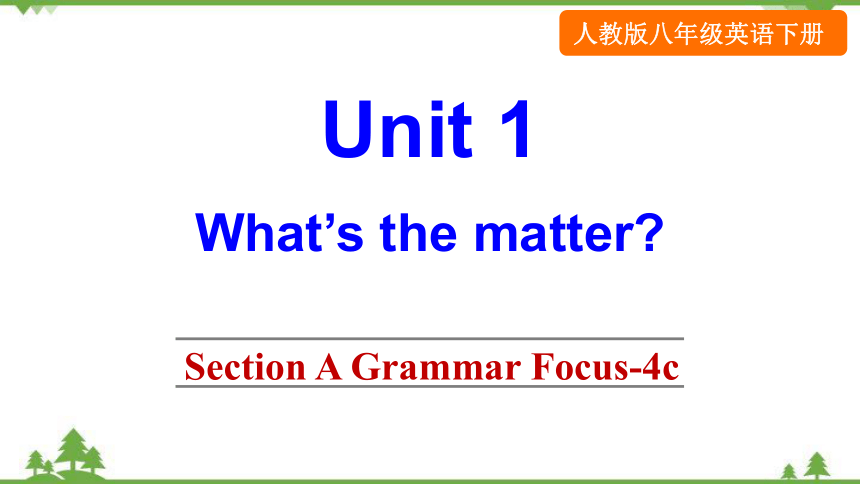 | |
| 格式 | ppt | ||
| 文件大小 | 671.0KB | ||
| 资源类型 | 教案 | ||
| 版本资源 | 人教新目标(Go for it)版 | ||
| 科目 | 英语 | ||
| 更新时间 | 2022-05-31 12:42:41 | ||
图片预览

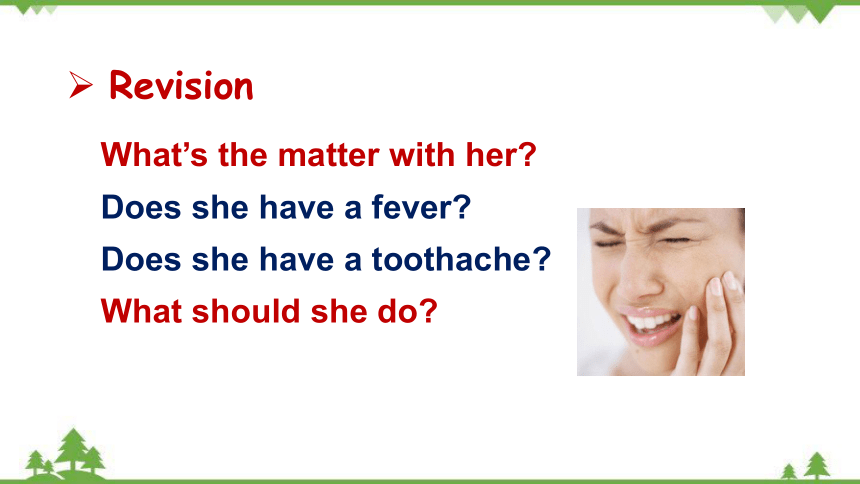
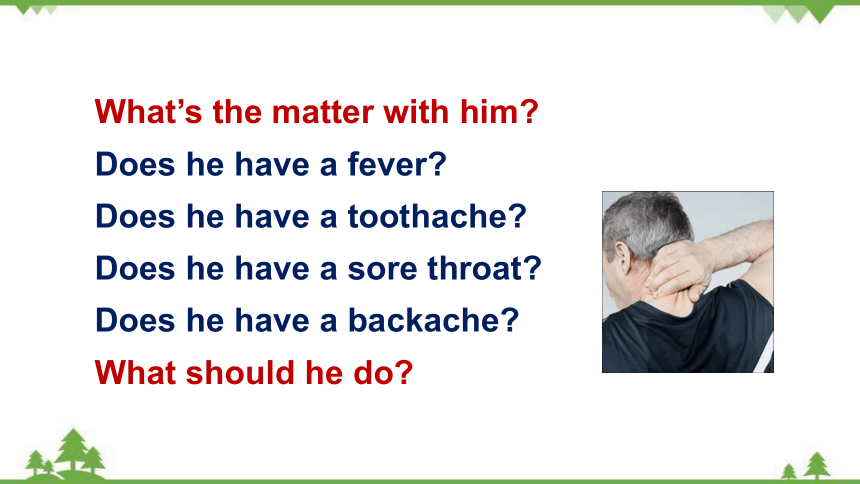
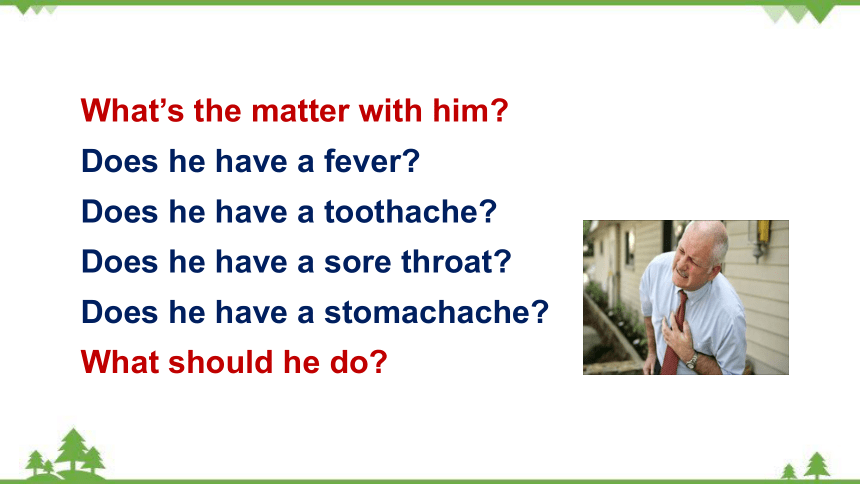
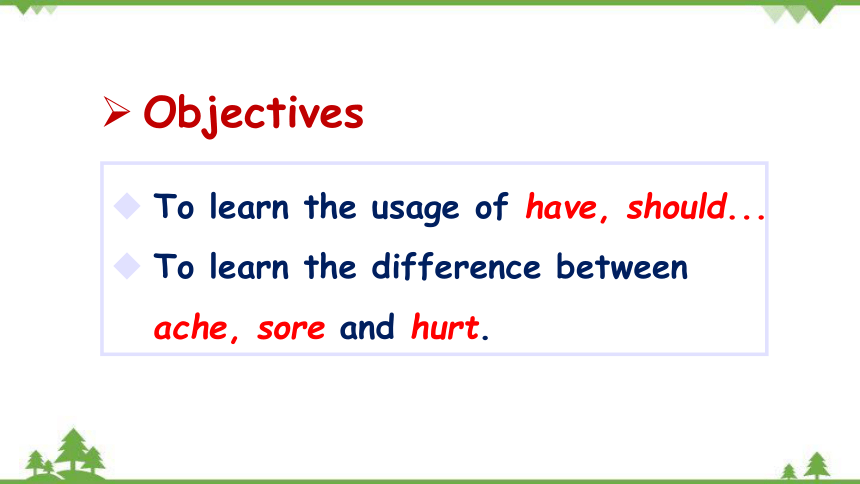
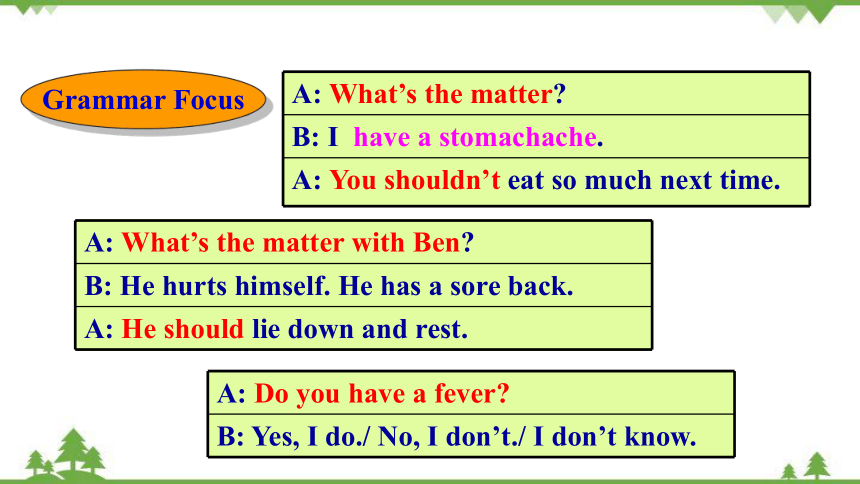
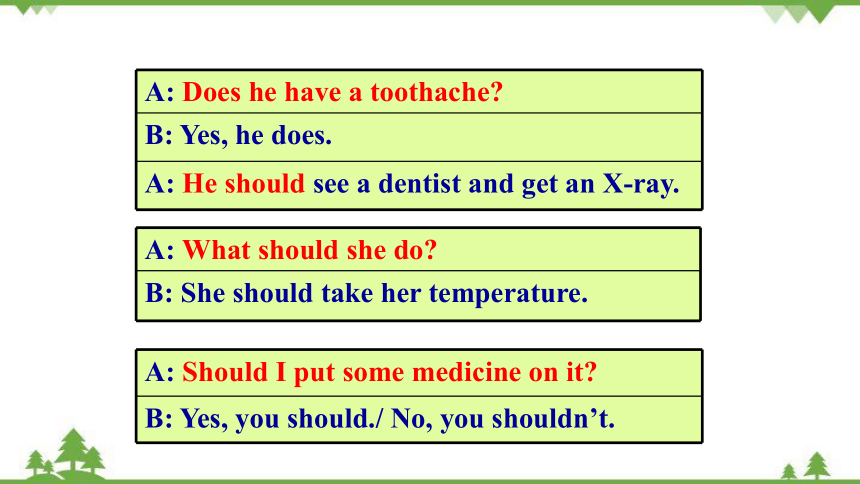
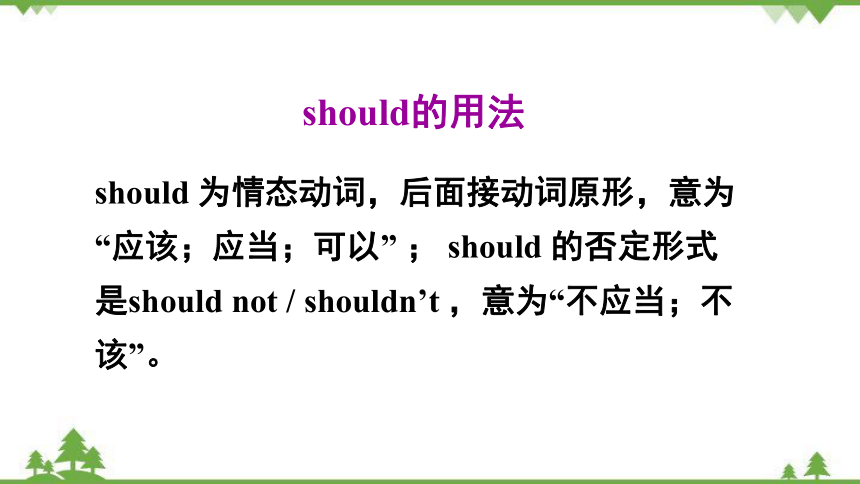
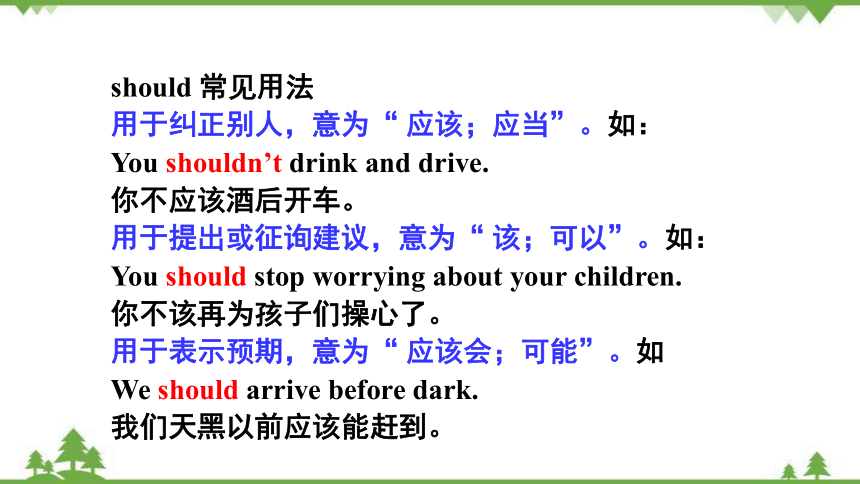
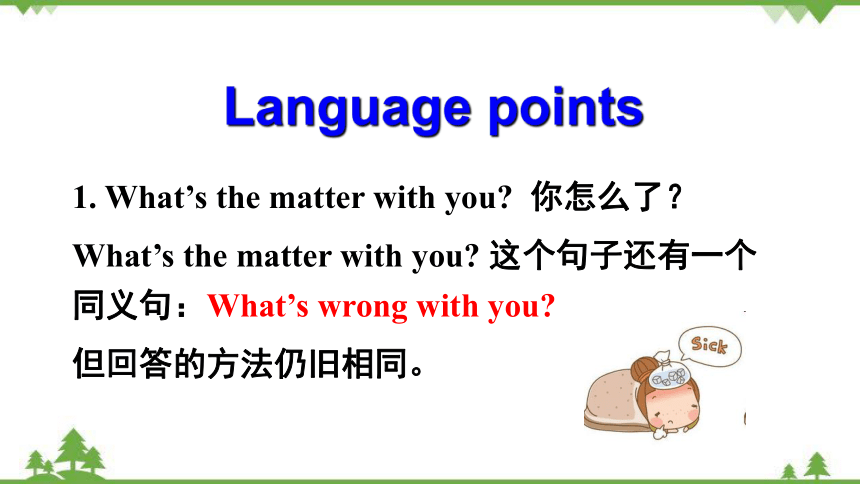
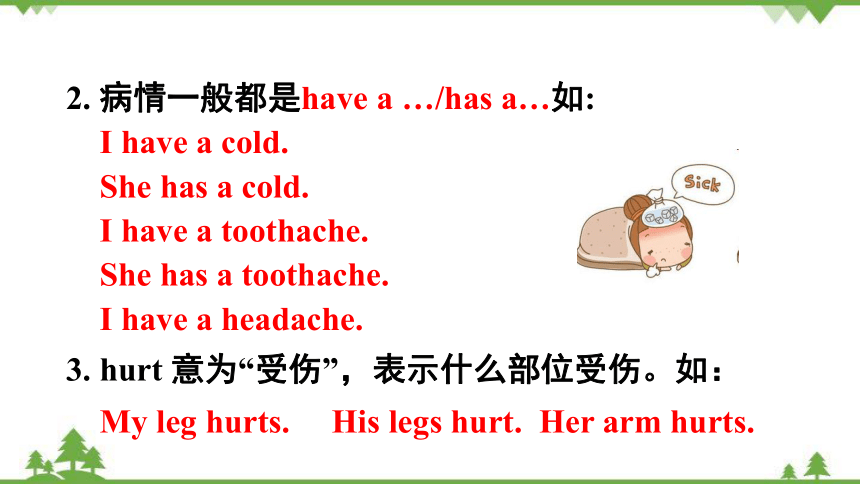
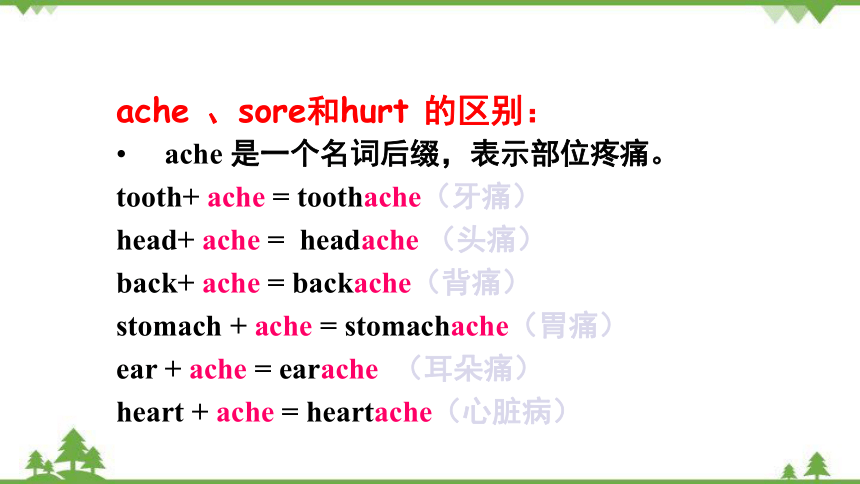
文档简介
(共33张PPT)
Unit 1
What’s the matter
人教版八年级英语下册
Section A Grammar Focus-4c
What’s the matter with her
Does she have a fever
Does she have a toothache
What should she do
Revision
What’s the matter with him
Does he have a fever
Does he have a toothache
Does he have a sore throat
Does he have a backache
What should he do
What’s the matter with him
Does he have a fever
Does he have a toothache
Does he have a sore throat
Does he have a stomachache
What should he do
To learn the usage of have, should...
To learn the difference between ache, sore and hurt.
Objectives
A: What’s the matter
B: I have a stomachache.
A: You shouldn’t eat so much next time.
Grammar Focus
A: What’s the matter with Ben
B: He hurts himself. He has a sore back.
A: He should lie down and rest.
A: Do you have a fever
B: Yes, I do./ No, I don’t./ I don’t know.
A: Does he have a toothache
B: Yes, he does.
A: He should see a dentist and get an X-ray.
A: What should she do
B: She should take her temperature.
A: Should I put some medicine on it
B: Yes, you should./ No, you shouldn’t.
should的用法
should 为情态动词,后面接动词原形,意为“应该;应当;可以” ; should 的否定形式是should not / shouldn’t ,意为“不应当;不该”。
should 常见用法
用于纠正别人,意为“ 应该;应当”。如:
You shouldn’t drink and drive.
你不应该酒后开车。
用于提出或征询建议,意为“ 该;可以”。如:
You should stop worrying about your children.
你不该再为孩子们操心了。
用于表示预期,意为“ 应该会;可能”。如
We should arrive before dark.
我们天黑以前应该能赶到。
1. What’s the matter with you 你怎么了?
What’s the matter with you 这个句子还有一个同义句:What’s wrong with you
但回答的方法仍旧相同。
Language points
2. 病情一般都是have a …/has a…如:
I have a cold.
She has a cold.
I have a toothache.
She has a toothache.
I have a headache.
3. hurt 意为“受伤”,表示什么部位受伤。如:
My leg hurts. His legs hurt. Her arm hurts.
ache 、sore和hurt 的区别:
ache 是一个名词后缀,表示部位疼痛。
tooth+ ache = toothache(牙痛)
head+ ache = headache (头痛)
back+ ache = backache(背痛)
stomach + ache = stomachache(胃痛)
ear + ache = earache (耳朵痛)
heart + ache = heartache(心脏病)
ache 这个单词本身就是一个单独的单词,表示“疼痛”的意思,与tooth、head等单词合在一起组成一个新的单词,这就叫作复合名词,发音为/ek/。
除此之外,我们以前还学过许多这样的单词,如:bedroom,snowman,watermelon, eggplant,newspaper等等都是复合名词。
(2) sore 是一个形容词,用来修饰名词,指的是身体某一部位的酸痛。如:sore back, sore throat
(3) hurt是一个动词,指“刺痛,使受伤痛”。如:
He hurts his leg. = His leg hurts. 他腿疼。
第三人称单数知识扩充:
一、人称代词he, she, it是第三人称单数。如:
He likes watching TV.
他喜欢看电视。
It looks like a cat.
它看起来像只猫。
二、单个人名、地名或称呼作主语,是第三人称单数。如:
Xiao li looks like her mother.
小丽看起来像她的母亲。
Beijing is in China. 北京在中国。
Uncle Wang often makes cakes.
王叔叔经常做蛋糕。
三、单数可数名词或“this / that / the+单数可数名词”作主语时,是第三人称单数。如:
A horse is a useful animal. 马是有用的动物。
This book is yours. 这本书是你的。
That car is red. 那辆小汽车是红色的。
The cat is Lucy’s. 这只猫是露茜的。
四、不定代词someone,somebody,nobody,everything,something等及指示代词this,that 作主语时,是第三人称单数。如:
Everyone is here. 大家到齐了。
There is something wrong with the watch.
这块手表有毛病。
This is a pen. 这是一支钢笔。
That is an eraser. 那是一块橡皮擦。
五、不可数名词作主语时为第三人称单数。如:
The milk is in the glass. 牛奶在玻璃杯里。
The bread is very small. 那面包很小。
六、当数字或字母作主语时,看作第三人称单数。如:
“6” is a lucky number. “6”是个吉利的数字。
“I” is a letter. “I”是个字母。
A: I hurt ________ when I played basketball
yesterday. What _______ I do
B: You _______ see a doctor and get an X-ray.
2. A: ________the matter
B: My sister and I ______ sore throats. _______
we go to school
A: No, you ___________.
myself
should
should
What’s
have
Should
shouldn’t
Fill in the blanks and practice the conversations.
4a
3. A: _______ Mike ______ a fever
B: No, he ________. He ____ a stomachache.
A: He _______ drink some hot tea.
Does
have
doesn’t
has
should
1. Jenny cut herself.
She should (get an X-ray / put some medicine on the cut).
My advice:
_____________________________________.
Circle the best advice for these health problems. Then add your advice.
She should put some medicine on the cut
4b
Kate has a toothache.
She should (see a dentist / get some sleep).
My advice:__________________________.
Mary and Sue have colds.
They shouldn’t (sleep / exercise).
My advice:___________________________.
She should see a dentist
They shouldn’t exercise
Bob has a sore back.
He should (lie down and rest / take his
temperature).
My advice:__________________________.
He should lie down and rest
A: What’s the matter Did you hurt yourself
playing soccer
B: No, I didn’t.
C: Did you fall down
B: Yes, I did.
D: You should go home and get some rest.
One student mimes a problem. The other students in your group guess the problem and give advice.
4c
Name Problem Advice
Liu Peng fall down go home and rest
I. 请根据提示做题。
1. My brother’s leg _______.(受伤)
2. Kevin’s ears ________. (受伤)
3. I_____ my arms. (受伤)
4. The boy’s finger is ______. (受伤)
5. Lily’s shoulders _______. (受伤)
hurts
hurt
hurt
hurt
hurt
Exercises
6.The old woman feels ______ (疲劳) after a long walk.
7. His son has a _________ (头疼).
8. I have a ___________(嗓子疼), so I can’t speak
a word.
9. I brush my ________ (牙)twice a day.
10. The little boy eats too much, he has a
_____________ (肚子疼).
tired
headache
sore throat
teeth
stomachache
11. I have a earache. (就划线部分提问)
________________________________
________________________________
12. My teeth are sore.
(写出这个句子的同义句)
________________________________
________________________________
What’s the matter/trouble with you
What’s wrong with you
I have a toothache.
My teeth hurt .
II. 根据汉语意思完成下列句子。
1. 你应该按时完成作业。
You _______ ______ your homework on time.
2. 你不应该相信陌生人。
You __________ _______ strangers.
3. 我应该打开窗户吗?
______ ____ ______ the window
should finish
shouldn’t believe
Should I open
III. 将下列单词组成正确的句子。
1. should, to, healthy, you, exercise, stay
2. shouldn’t, tired, she, when, study, she, is
3. Sonia, shouldn’t, party, tonight, to, go, the, certainly
You should exercise to stay healthy.
She shouldn’t study when she is tired.
Sonia certainly shouldn’t go to the party tonight.
Homework
Make sentences with the following
structure.
what’s the matter
I have a …
2. Do you have a …
Yes, …. / No, …
3. Should I /he /she/ they …
Yes, …. / No, …
Unit 1
What’s the matter
人教版八年级英语下册
Section A Grammar Focus-4c
What’s the matter with her
Does she have a fever
Does she have a toothache
What should she do
Revision
What’s the matter with him
Does he have a fever
Does he have a toothache
Does he have a sore throat
Does he have a backache
What should he do
What’s the matter with him
Does he have a fever
Does he have a toothache
Does he have a sore throat
Does he have a stomachache
What should he do
To learn the usage of have, should...
To learn the difference between ache, sore and hurt.
Objectives
A: What’s the matter
B: I have a stomachache.
A: You shouldn’t eat so much next time.
Grammar Focus
A: What’s the matter with Ben
B: He hurts himself. He has a sore back.
A: He should lie down and rest.
A: Do you have a fever
B: Yes, I do./ No, I don’t./ I don’t know.
A: Does he have a toothache
B: Yes, he does.
A: He should see a dentist and get an X-ray.
A: What should she do
B: She should take her temperature.
A: Should I put some medicine on it
B: Yes, you should./ No, you shouldn’t.
should的用法
should 为情态动词,后面接动词原形,意为“应该;应当;可以” ; should 的否定形式是should not / shouldn’t ,意为“不应当;不该”。
should 常见用法
用于纠正别人,意为“ 应该;应当”。如:
You shouldn’t drink and drive.
你不应该酒后开车。
用于提出或征询建议,意为“ 该;可以”。如:
You should stop worrying about your children.
你不该再为孩子们操心了。
用于表示预期,意为“ 应该会;可能”。如
We should arrive before dark.
我们天黑以前应该能赶到。
1. What’s the matter with you 你怎么了?
What’s the matter with you 这个句子还有一个同义句:What’s wrong with you
但回答的方法仍旧相同。
Language points
2. 病情一般都是have a …/has a…如:
I have a cold.
She has a cold.
I have a toothache.
She has a toothache.
I have a headache.
3. hurt 意为“受伤”,表示什么部位受伤。如:
My leg hurts. His legs hurt. Her arm hurts.
ache 、sore和hurt 的区别:
ache 是一个名词后缀,表示部位疼痛。
tooth+ ache = toothache(牙痛)
head+ ache = headache (头痛)
back+ ache = backache(背痛)
stomach + ache = stomachache(胃痛)
ear + ache = earache (耳朵痛)
heart + ache = heartache(心脏病)
ache 这个单词本身就是一个单独的单词,表示“疼痛”的意思,与tooth、head等单词合在一起组成一个新的单词,这就叫作复合名词,发音为/ek/。
除此之外,我们以前还学过许多这样的单词,如:bedroom,snowman,watermelon, eggplant,newspaper等等都是复合名词。
(2) sore 是一个形容词,用来修饰名词,指的是身体某一部位的酸痛。如:sore back, sore throat
(3) hurt是一个动词,指“刺痛,使受伤痛”。如:
He hurts his leg. = His leg hurts. 他腿疼。
第三人称单数知识扩充:
一、人称代词he, she, it是第三人称单数。如:
He likes watching TV.
他喜欢看电视。
It looks like a cat.
它看起来像只猫。
二、单个人名、地名或称呼作主语,是第三人称单数。如:
Xiao li looks like her mother.
小丽看起来像她的母亲。
Beijing is in China. 北京在中国。
Uncle Wang often makes cakes.
王叔叔经常做蛋糕。
三、单数可数名词或“this / that / the+单数可数名词”作主语时,是第三人称单数。如:
A horse is a useful animal. 马是有用的动物。
This book is yours. 这本书是你的。
That car is red. 那辆小汽车是红色的。
The cat is Lucy’s. 这只猫是露茜的。
四、不定代词someone,somebody,nobody,everything,something等及指示代词this,that 作主语时,是第三人称单数。如:
Everyone is here. 大家到齐了。
There is something wrong with the watch.
这块手表有毛病。
This is a pen. 这是一支钢笔。
That is an eraser. 那是一块橡皮擦。
五、不可数名词作主语时为第三人称单数。如:
The milk is in the glass. 牛奶在玻璃杯里。
The bread is very small. 那面包很小。
六、当数字或字母作主语时,看作第三人称单数。如:
“6” is a lucky number. “6”是个吉利的数字。
“I” is a letter. “I”是个字母。
A: I hurt ________ when I played basketball
yesterday. What _______ I do
B: You _______ see a doctor and get an X-ray.
2. A: ________the matter
B: My sister and I ______ sore throats. _______
we go to school
A: No, you ___________.
myself
should
should
What’s
have
Should
shouldn’t
Fill in the blanks and practice the conversations.
4a
3. A: _______ Mike ______ a fever
B: No, he ________. He ____ a stomachache.
A: He _______ drink some hot tea.
Does
have
doesn’t
has
should
1. Jenny cut herself.
She should (get an X-ray / put some medicine on the cut).
My advice:
_____________________________________.
Circle the best advice for these health problems. Then add your advice.
She should put some medicine on the cut
4b
Kate has a toothache.
She should (see a dentist / get some sleep).
My advice:__________________________.
Mary and Sue have colds.
They shouldn’t (sleep / exercise).
My advice:___________________________.
She should see a dentist
They shouldn’t exercise
Bob has a sore back.
He should (lie down and rest / take his
temperature).
My advice:__________________________.
He should lie down and rest
A: What’s the matter Did you hurt yourself
playing soccer
B: No, I didn’t.
C: Did you fall down
B: Yes, I did.
D: You should go home and get some rest.
One student mimes a problem. The other students in your group guess the problem and give advice.
4c
Name Problem Advice
Liu Peng fall down go home and rest
I. 请根据提示做题。
1. My brother’s leg _______.(受伤)
2. Kevin’s ears ________. (受伤)
3. I_____ my arms. (受伤)
4. The boy’s finger is ______. (受伤)
5. Lily’s shoulders _______. (受伤)
hurts
hurt
hurt
hurt
hurt
Exercises
6.The old woman feels ______ (疲劳) after a long walk.
7. His son has a _________ (头疼).
8. I have a ___________(嗓子疼), so I can’t speak
a word.
9. I brush my ________ (牙)twice a day.
10. The little boy eats too much, he has a
_____________ (肚子疼).
tired
headache
sore throat
teeth
stomachache
11. I have a earache. (就划线部分提问)
________________________________
________________________________
12. My teeth are sore.
(写出这个句子的同义句)
________________________________
________________________________
What’s the matter/trouble with you
What’s wrong with you
I have a toothache.
My teeth hurt .
II. 根据汉语意思完成下列句子。
1. 你应该按时完成作业。
You _______ ______ your homework on time.
2. 你不应该相信陌生人。
You __________ _______ strangers.
3. 我应该打开窗户吗?
______ ____ ______ the window
should finish
shouldn’t believe
Should I open
III. 将下列单词组成正确的句子。
1. should, to, healthy, you, exercise, stay
2. shouldn’t, tired, she, when, study, she, is
3. Sonia, shouldn’t, party, tonight, to, go, the, certainly
You should exercise to stay healthy.
She shouldn’t study when she is tired.
Sonia certainly shouldn’t go to the party tonight.
Homework
Make sentences with the following
structure.
what’s the matter
I have a …
2. Do you have a …
Yes, …. / No, …
3. Should I /he /she/ they …
Yes, …. / No, …
同课章节目录
- Unit 1 What's the matter?
- Section A
- Section B
- Unit 2 I'll help to clean up the city parks.
- Section A
- Section B
- Unit 3 Could you please clean your room?
- Section A
- Section B
- Unit 4 Why don't you talk to your parents?
- Section A
- Section B
- Unit 5 What were you doing when the rainstorm came
- Section A
- Section B
- Review of Units 1-5
- Unit 6 An old man tried to move the mountains.
- Section A
- Section B
- Unit 7 What's the highest mountain in the world?
- Section A
- Section B
- Unit 8 Have you read Treasure Island yet?
- Section A
- Section B
- Unit 9 Have you ever been to a museum?
- Section A
- Section B
- Unit 10 I've had this bike for three years.
- Section A
- Section B
